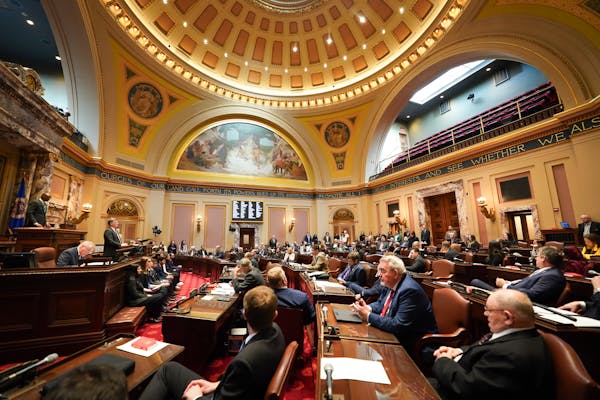In the post-game recaps early Monday morning, Minnesota's two political parties painted a wildly different picture of what to take away from the 2024 legislative session.
Republicans saw "absolute" chaos and a breakdown in the process after the majority "rammed through the last of their partisan priorities" in a last-minute bill that spanned more than 1,400 pages and few could even read.
Democrats agreed the process was flawed, but put the blame on "unprecedented delays" over the past few weeks caused by hourslong Republican filibusters on a number of bills.
The result was a final session day on Sunday that was full of frantic work as lawmakers tried to triage their priorities in order to get as many things passed as possible and sent to Gov. Tim Walz's desk. But in all of the chaos — and yelling — during the Legislature's final moments, it was unclear to many what exactly made it into the sweeping bills lawmakers were stitching together.
Here's a breakdown of what did — and did not — pass on the final day of session, and what could happen next.
Did pass:
Uber Lyft: It took an 11-hour delay on Saturday and a halt to almost all legislative work in the Senate, but Democrats managed to strike a deal with ride-hailing drivers and companies to set a minimum pay standard of $1.28 per mile and 31 cents per minute. The bill is heading to the governor, who is expected to sign it, keeping the companies from leaving the state as promised on July 1. The new rates would take effect Jan. 1.
Emergency medical services: Rural ambulance providers made the case all session that they were facing a financial cliff and needed help from lawmakers. In the final days of session, a bipartisan group of lawmakers put together a $24 million funding package and established a Sprint Medic pilot program in Otter Tail and St. Louis counties with $6 million to try to cut down delivery times and gather data on how best to serve the areas.
Gun bills: Lawmakers managed to push through two changes to gun laws in response to the shooting deaths of three first responders in Burnsville in February. The bill that passed increases penalties for straw purchases, which occur when a person legally buys a firearm on behalf of a person who is prohibited from purchasing one. It also bans binary triggers, devices that allow one shot to be fired with the pull of a trigger and a second shot with the trigger release.
Cannabis changes: Minnesota lawmakers legalized recreational marijuana for adults last year, but this year lawmakers passed a sweeping package of policy changes to prepare for the state's marketplace to get up and running. The bill tackles a number of issues, including allowing early planting times for certain entrepreneurs and creating a shift to a lottery-based system to award cannabis licenses.
Copper wire theft: Thefts of copper wire have gutted thousands of streetlights across Minnesota, and legislation is heading to Walz's desk that would require any person who is selling copper metal to have a state-issued license, locking thieves out of the marketplace.
Paid leave changes: In another tweak to a major law passed last year, legislators agreed to make changes to the state's new paid family and medical leave program to clarify how the benefits will roll out before it starts being used by workers in 2026. It also clarifies eligibility requirements, benefit amounts and the application process.
Child tax credit: Included in the massive bill that passed the Legislature in the final hour are changes to the state's child tax credit, which passed last session. It would make it possible to stagger the credit over multiple payments instead of receiving it in one lump sum after taxes.
Historical Horse Racing: Lawmakers in both chambers voted to ban historical horse racing at Canterbury Park and Running Aces, a machine-based game that allows users to wager on past horse races. The tracks tried to start using those games this year, but it faced pushback from the tribes and Democrats in the Legislature, who said it was an illegal step to create games that are similar to slot machines.
Medical debt: Restrictions on medical debt collection were consolidated in a commerce budget bill that lawmakers approved Friday. Starting Oct. 1, hospitals and clinics can't deny medical care to patients with overdue bills, report medical debts to credit rating agencies or pursue collections if patients report that their bills contain mistakes.
Prior authorization: Insurers will no longer be able to use prior authorization to decide whether to pay for certain cancer treatments, or for outpatient mental health and substance abuse treatments other than medications. Lawmakers late Sunday also prevented insurers from using prior authorization redundantly when the treatment needs of patients with chronic diseases haven't changed.
Did not pass:
Equal Rights Amendment: After 15 hours of debate, the House passed a sweeping version of the Equal Rights Amendment over the weekend, which would have asked voters in 2026 if they want to add protections for everything from sex, gender and race to abortion access in the state's Constitution. The Senate, however, didn't take up the bill before the clock ran out Sunday. Groups supporting the amendment are already calling for a special session to put it on the ballot, but DFL leaders said that's unlikely.
Bonding bill: Despite both sides coming into the 2024 session wanting to pass a package of statewide construction projects, the breakdown between the two parties at the end prevented them from striking a deal. Democrats pitched a $930 million bonding bill with extra in cash, but even a last-minute bill to do a few projects with cash failed in the Senate, which missed the midnight deadline by 30 seconds.
Sports betting: Minnesota will not join its neighboring states in legalizing mobile sports betting this year, despite a last-minute scramble from the bill's supporters on Monday to strike a deal. They weren't able to pull together a proposal that would get enough bipartisan votes and satisfy the state's tribes and the two horse-racing tracks.
Ranked-choice voting: A bill that would have given local units of government the option to use a ranked-choice voting system for nonpartisan and municipal elections made it to the House floor in the session's final day, but failed to pass after several Democrats voted with Republicans against the proposal.
Star Tribune staff writer Jeremy Olson contributed to this report.

Lufthansa begins nonstop service from MSP to Germany on Tuesday

Prep Athletes of the Week: Pitcher zeroes in on state berth

What we know so far about the Minneapolis police shooting
![The Kenilworth Corridor between 21st Street and Cedar Lake Parkway. ] GLEN STUBBE • glen.stubbe@startribune.com Friday, April 19, 2019 Pretty s](https://arc.stimg.co/startribunemedia/ME26TIQV6VZPFS3OLZ5GTCCIZE.jpg?h=91&w=145&fit=crop&bg=999&crop=faces)
Crews fix improperly installed Southwest LRT tracks

